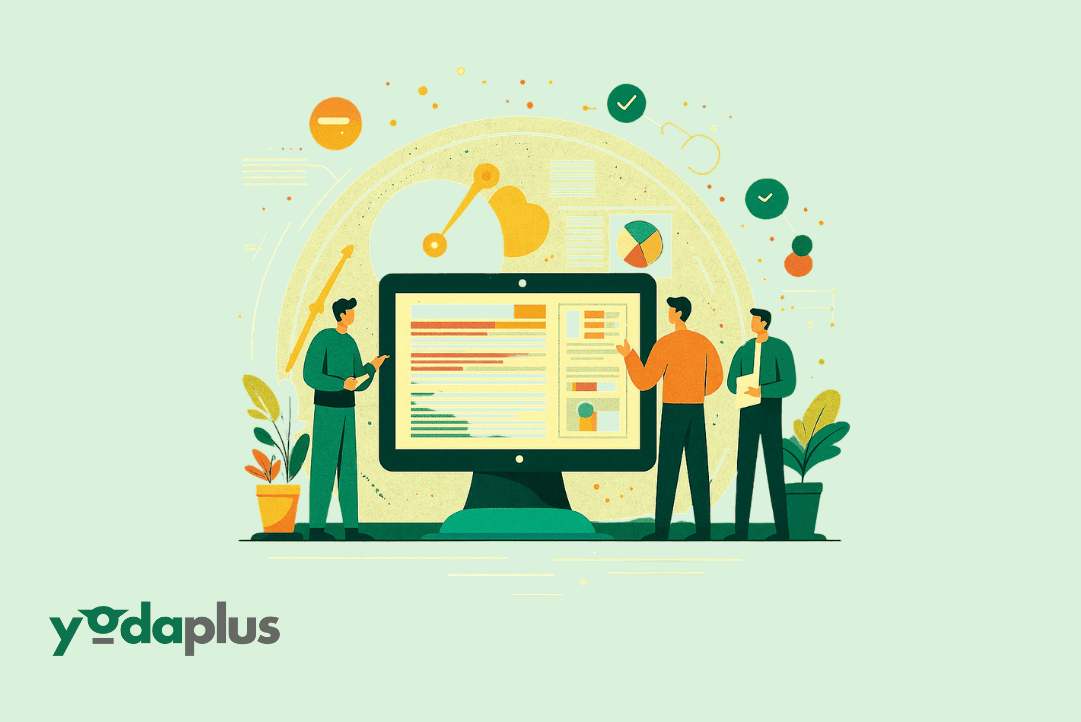
AI-Orchestrated Procurement + Supplier Negotiation Workflows
August 8, 2025 By Yodaplus
In the fast-changing world of supply chain management, procurement has evolved from a simple purchasing function into a strategic driver of business value. The way companies select suppliers, negotiate contracts, and manage relationships directly impacts cost efficiency, product quality, and operational agility.
Artificial Intelligence (AI) is now becoming a central player in this space, transforming procurement and supplier negotiations into streamlined, data-driven workflows. Rather than relying on scattered communications and manual spreadsheets, businesses can now use AI to orchestrate every step of the process from supplier selection to final contract signing.
What Does AI-Orchestrated Procurement Mean?
AI-orchestrated procurement refers to an end-to-end procurement process where AI systems coordinate, optimize, and automate tasks traditionally done by humans. This goes beyond robotic process automation (RPA), which simply digitizes repetitive tasks. Instead, AI brings cognitive capabilities analyzing supplier performance, predicting market trends, and recommending the best negotiation strategies in real time.
In this approach, procurement workflows become connected, adaptive, and intelligent. For example, when demand changes, the system can automatically re-prioritize supplier bids, initiate new negotiations, or recommend switching suppliers based on historical performance and market conditions.
Key Components of AI-Driven Procurement Workflows
- Supplier Discovery and Evaluation
AI-powered platforms can scan global supplier databases, industry directories, and past performance records to shortlist the most suitable vendors. Machine learning models evaluate multiple parameters such as delivery times, defect rates, compliance history, and pricing trends. - Automated RFx Processes (RFP, RFQ, RFI)
Generating and distributing Request for Proposals (RFPs), Quotations (RFQs), or Information (RFIs) can be fully automated. AI can personalize these documents based on supplier history and market conditions, ensuring faster and more accurate responses. - Intelligent Negotiation Assistance
Natural Language Processing (NLP) tools can analyze supplier communication styles, contract clauses, and pricing models to suggest the most effective negotiation tactics. AI can even simulate potential outcomes of different offers, helping procurement teams choose the best approach. - Real-Time Risk Assessment
AI systems can track supplier risk in real time by monitoring financial health, geopolitical developments, and compliance with regulations. This helps procurement teams adjust strategies instantly if a supplier’s risk profile changes. - Contract Management and Compliance Monitoring
Once an agreement is reached, AI tools can manage contract versions, flag non-compliance issues, and remind stakeholders of critical deadlines or renewal dates.
AI in Supplier Negotiation Workflows
Negotiations have always been a mix of art and science. The “art” is understanding the human dynamics building trust, reading body language, and managing relationships. The “science” lies in knowing the numbers, the market data, and the long-term impact of a deal.
AI enhances the “science” side significantly:
- Data-Backed Decision Making: AI can compare offers from multiple suppliers against historical pricing and industry benchmarks. This ensures negotiations are backed by factual, real-time data.
- Predictive Pricing Models: Machine learning can predict how a supplier might respond to price changes based on past behavior and market conditions.
- Sentiment Analysis: NLP algorithms can assess the tone and sentiment of supplier communications, helping procurement managers adjust their strategy accordingly.
- Scenario Planning: AI tools can run simulations of different negotiation outcomes, showing potential cost savings, delivery schedules, and quality impacts.
Benefits of AI-Orchestrated Procurement and Negotiations
- Faster Decision Cycles
Procurement processes that used to take weeks can now be completed in days or even hours thanks to automated data gathering and analysis. - Cost Savings Without Compromising Quality
AI identifies negotiation strategies that maximize savings while maintaining or improving supplier performance. - Improved Supplier Relationships
AI allows for proactive communication and transparency, fostering trust and long-term partnerships. - Reduced Risk Exposure
Continuous monitoring ensures early detection of compliance breaches, financial instability, or operational disruptions. - Scalability Across Regions
Global procurement teams can handle more suppliers and contracts without expanding headcount, thanks to automation and centralized AI coordination.
Practical Example: How It Works in Real Life
Let’s say a manufacturing company needs to secure a new supplier for a critical component. Here’s how an AI-orchestrated workflow might run:
- The system scans internal performance data and external market sources to shortlist five suppliers.
- It automatically sends out customized RFQs with delivery requirements and compliance clauses tailored to each supplier.
- As responses come in, AI ranks them based on price, delivery capability, and historical reliability.
- NLP tools analyze the wording in supplier responses, flagging potential risks or negotiation opportunities.
- The AI platform recommends an initial counteroffer, supported by historical market data.
- During negotiations, the system runs simulations to assess how changes in price or delivery terms would affect production schedules and costs.
- Once the best deal is reached, AI transfers the agreement into a smart contract system for compliance monitoring.
This seamless orchestration eliminates bottlenecks, reduces human error, and keeps procurement aligned with strategic goals.
The Future: Autonomous Procurement Agents
Looking ahead, AI in procurement will move towards autonomous agents systems that can execute low- to mid-level procurement decisions without human intervention. These agents will be able to:
- Detect supply chain disruptions instantly and secure backup suppliers.
- Negotiate standard terms within pre-approved limits.
- Auto-renew contracts or trigger competitive bidding when market conditions shift.
The human role will focus more on strategic supplier relationships, innovation sourcing, and governance, while AI handles the operational heavy lifting.
Conclusion
AI-orchestrated procurement and supplier negotiation workflows are redefining how organizations interact with vendors. They combine the speed and precision of automation with the strategic insights of data-driven intelligence.
By integrating AI tools into procurement systems, businesses can not only achieve cost savings but also improve supplier performance, reduce risk, and respond faster to market changes. With Yodaplus Supply Chain and Retail expertise, organizations can further enhance efficiency, ensure smarter vendor collaboration, and strengthen resilience. In an era where supply chain resilience is a competitive advantage, AI-powered procurement is no longer optional — it’s essential.